14
Dec
Resources & Links
On May 14, 2025, ECC was featured on TVO’s The Agenda with Steve Paikin to discuss What’s Going on at Ontario’s Correctional Institutions? The episode centered around recently released video footage from 2023 obtained from the Maplehurst Correctional Complex showing inmates facing collective punishment from guards in an incident one judge called a “gross display of power.” To discuss the incident panelists Andrea Monteiro, Demar Kemar Hewitt, Lee Chapelle, and Brendan Kennedy joined Steve Paikin in a lively discussion centred around overcrowding, systemic neglect, human dignity, and public safety. You can view the episode by clicking on the accompanying image.

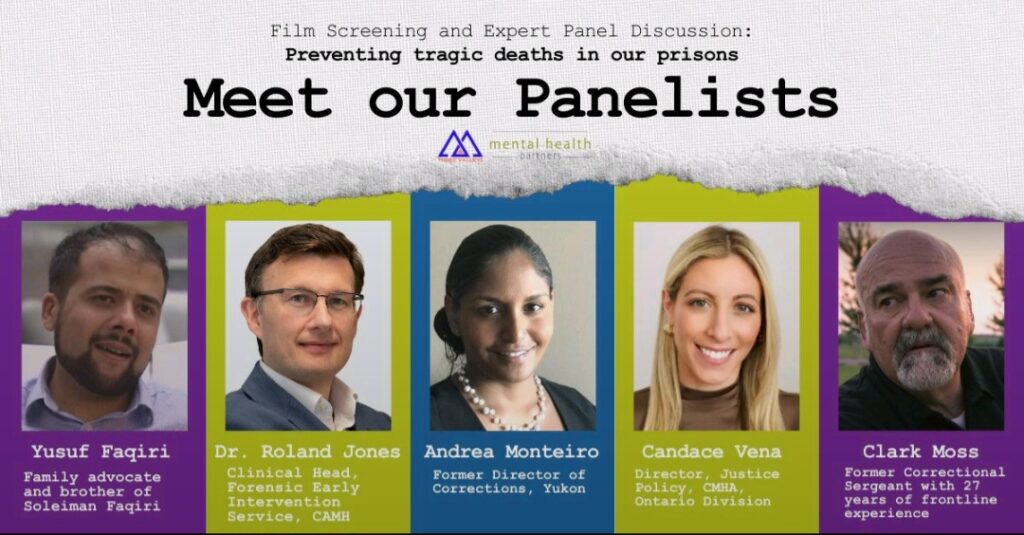
On April 29, 2025, ECC participated in a Film Screening and Expert Panel Discussion Preventing Tragic Deaths in our Prisons. The solutions-focused panel discussion centred around the coroner’s jury recommendations from from the tragic custodial death of Soleiman Faqiri. We discussed how we – as a collective – can move towards implementing the inquest recommendations and provide better support to individuals with mental health concerns enmeshed in the criminal justice system. Thank you to everyone who attended this important event.
The coroner’s inquest for six individuals at the Hamilton Wentworth Detention Centre spanned three weeks and heard from Andrea Monteiro in late November 2024. You can check out the CBC article highlighting her testimony by clicking on the accompanying photo.


On December 15, 2016, Soleiman Faqiri died in a jail cell while being restrained by correctional officers. This documentary follows Soleiman’s brother as he witnesses what happened to Soleiman during his final days, and the moments prior to his death. The documentary highlights personal stories about Soleiman as well as elements from the Coroner’s Inquest that ultimately resulted in a jury verdict of homicide. Andrea Monteiro provided testimony evidence as a witness with expertise at the Coroner’s Inquest on the importance of operationalizing an individualized care approach to safely manage individuals in custody, the importance of operationalizing an interdisciplinary team approach to provide holistic care for individuals with complex needs, and, why operational policy does not always translate into safe and humane correctional practice, .
The Mapping Solitary Confinement project seeks to draw a picture of how, when, why and for how long people can be placed in solitary confinement in different countries across the world, and what their daily lives look like. The project also aims to identify common patterns and issues as well as good practice, and help inform reform efforts. ECC is proud to see that reform efforts completed in Yukon, Canada were noted as a “good practice example”.
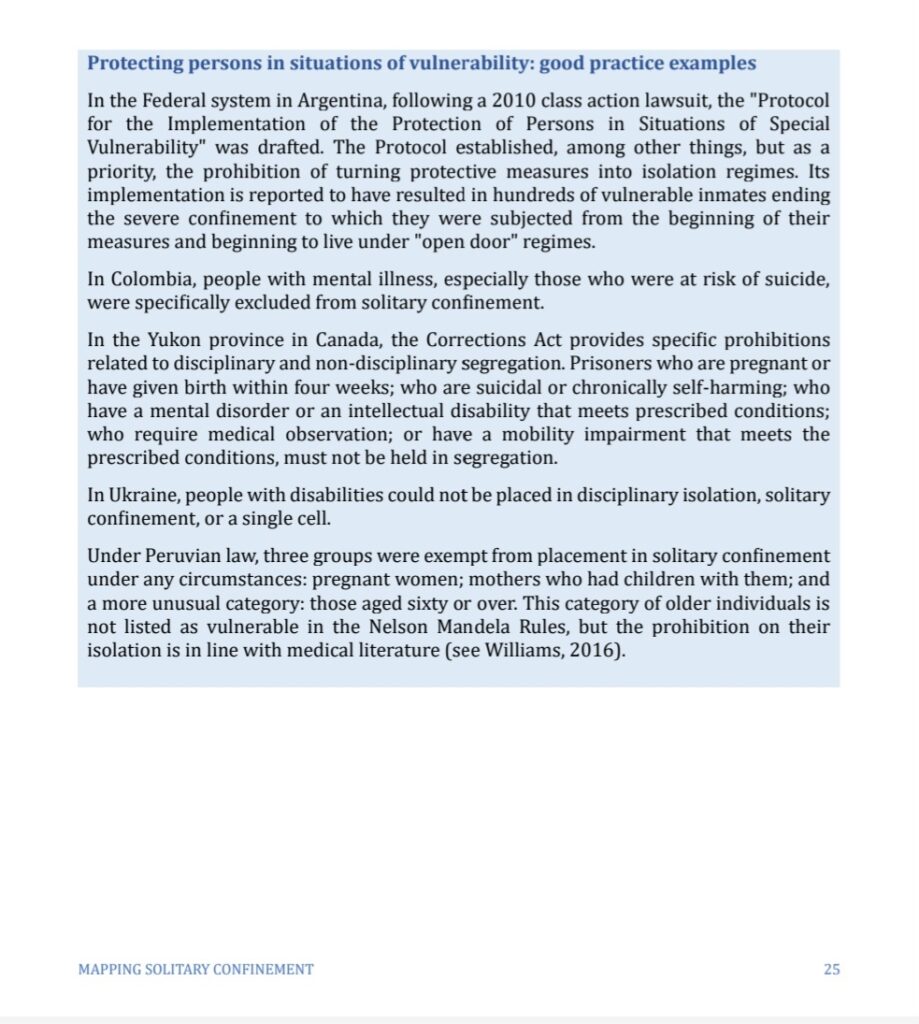
On December 15, 2023 Andrea Monteiro had the privilege of speaking with fill-in host Tamara Cherry from Newstalk 1010 about key takeaways from Soleiman Faqiri’s coroner’s inquest and why she believes “courageous leadership” is required to make meaningful change within corrections.

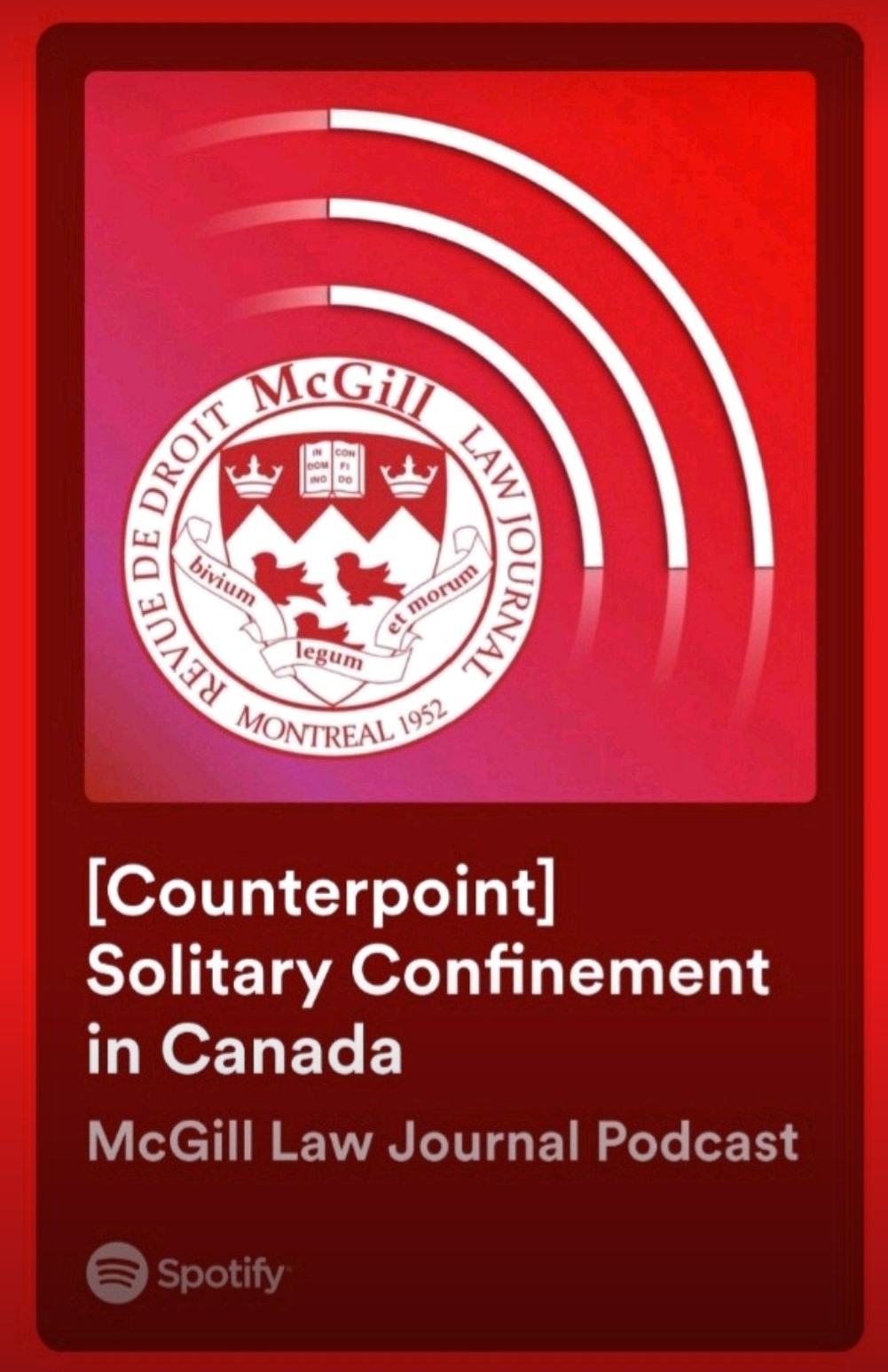
In June 2023 ECC participated in a podcast for the McGill Law Journal. This episode explores the practice of solitary confinement in Canada and the winding road towards its abolition. Both Andrea Monteiro (former Director of Corrections for the Government of Yukon and founder of Ethical Correctional Consulting Inc.) and Nora Demnati (a Montreal-based prison lawyer and instructor at McGill’s Faculty of Law) spoke about the challenges of piecemeal reform vs system-wide change of the prison system. Check out the podcast to learn about the history and evolution of solitary confinement, why its elimination has proved difficult, and how the practice – or prisons themselves – might eventually be overcome.
The 2022 Canadian Criminal Justice Association’s Justice Report featured our article Segregation North of Sixty: Meaningful Reform in Yukon Corrections. Have a read to see how, from 2019-2021, Yukon operationalized meaningful correctional practices aimed at humanely managing the day-to-day needs of complex clients.
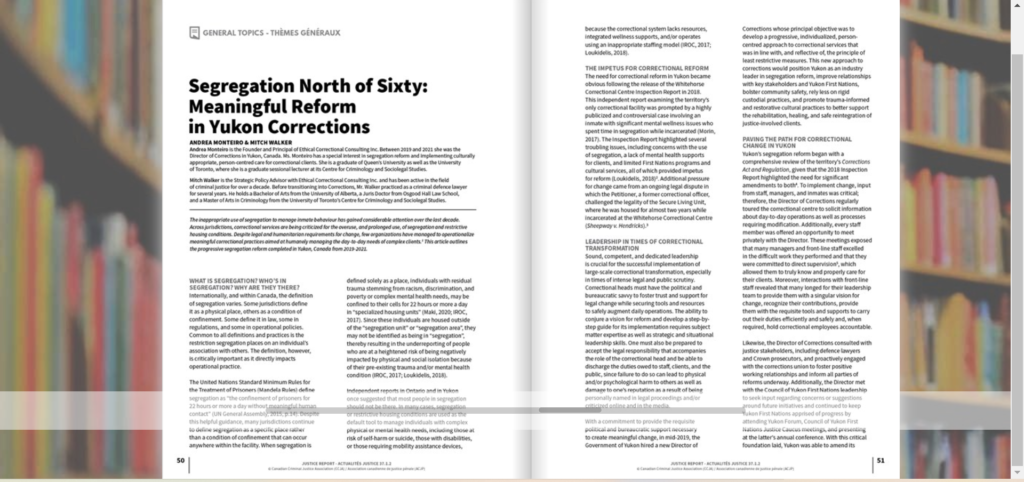
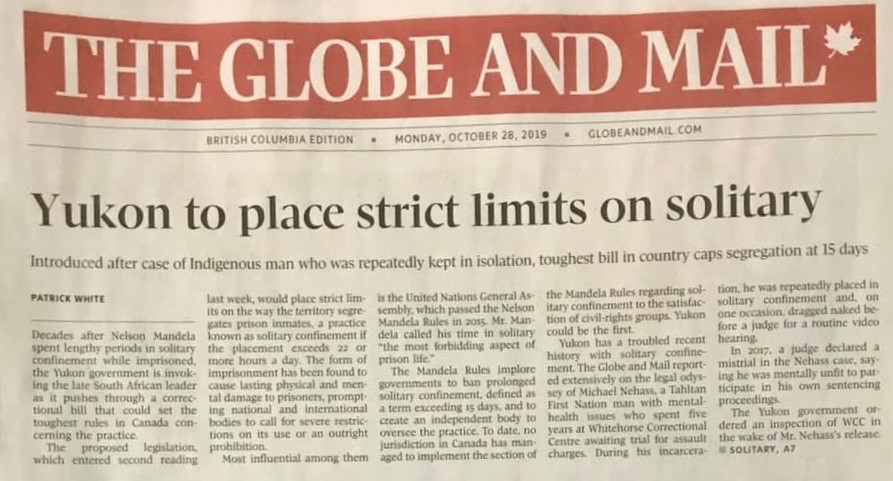
In June 2020, the Government of Yukon became the first jurisdiction in Canada to introduce, proclaim, and operationalize progressive, transformative segregation legislation and regulations. Statutory and operational reform included a new definition of segregation, prohibitions for vulnerable populations, external oversight, and accountability. These changes were made to ensure the provision of safe, humane conditions for individuals held in conditions that amount to solitary confinement (as defined in the United Nations Mandela Rules).
In 2019, working in collaboration with the Council of Yukon First Nations, we provided an avenue for individuals incarcerated at the Whitehorse Correctional Centre to access spiritual renewal, healing and connection with traditional knowledge and practices by constructing and operationalizing a new sweat lodge program at the correctional centre.

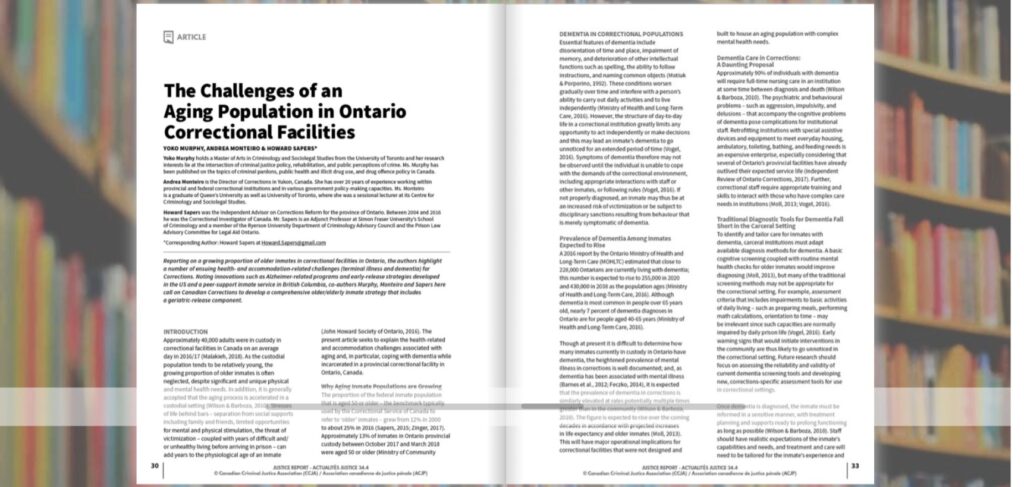
Correctional systems throughout North America are desperately trying to navigate the complexities of managing the challenges of an aging carceral population. Serious consideration needs to be given to decarceration if the individual no longer poses a risk to public safety. Contact us to see what decarceration initiatives we have already safely implemented for Canadian correctional systems across the country.
Reducing Ontario’s Provincial Carceral Footprint through Correctional Reform (found in the Journal of Community Corrections) provides an overview of recommendations made by the Independent Review of Ontario Corrections (IROC) regarding the use of gradual release mechanisms such as temporary absences, provincial parole provisions, current attempts at strengthening community supports in Ontario, and the need to better support Indigenous peoples who come into contact with the criminal justice system.


In May 2020, our innovative thinking led to something completely radical. We were the first in Canada to retrofit an under-utilized portion of a maximum security correctional facility and turn it into community beds for justice-involved men. When we reference our commitment to correctional reform and the principle of least restrictive measures we aren’t just talking and writing reports, we’re building relationships and implementing programs with the help of willing community partners.
Reports from the Independent Review of Ontario Corrections
Segregation in Ontario calls for profound changes to segregation practices in Ontario’s correctional system. Although the report was written for the Ontario Government, many of the 63 interdependent recommendations are applicable to any correctional organization committed to transforming their current system into a modern outcomes‐focused, care‐based correctional service.
Successfully implementing these recommendations will lead to a progressive and individualized correctional facility that improves community safety, relies less on custody and focuses more on rehabilitation and reintegration.
Simply put, Corrections in Ontario: Directions for Reform is a roadmap for the transformation of an entire correctional system – pre-trial detention, sentenced custody and community reintegration. Distinct chapters are deliberately dedicated to reforms needed to better support Indigenous people and improve the provision of correctional health care services. Each section of this report reflects on Ontario law, policies and practices in light of the evidence of ‘what works’ in corrections and the underlying values of dignity, respect, and legality.
The report contains 62 recommendations under the following themes:
- Human rights and correctional operations;
- Corrections and the presumption of innocence;
- Evidence-based correctional practice;
- Indigenous people and Ontario corrections; and
- Health care service and governance in corrections.
The Independent Review of Ontario Corrections’ Institutional Violence in Ontario: Interim Report presents an initial overview, analysis, and immediate findings regarding staff and ministry-reported violence within the Ministry of Community Safety and Correctional Services’ correctional institutions.
This initial report is the result of a 90-day investigation into the reported increase in inmate-on-staff violence and presents findings under the following themes:
- Understanding Ontario institutional violence in context;
- Data management, statistical trends, and reporting practices; and,
- Exploration of evidence-based responses to mitigate institutional violence.
Institutional Violence in Ontario: Final Report builds upon many of the findings in the August 2018 Interim Report, and presents an in-depth analysis of the Ontario correctional institution that reported the highest number and greatest rate of increase in reported incidents of inmate-on-staff violence in 2017 – the Toronto South Detention Centre (TSDC).
While some of the findings and recommendations are specific to TSDC, others apply more broadly across correctional
institutions. The Final Report presents key findings and offers 42 recommendations under the
following themes:
- Data collection and information sharing;
- Institutional culture and staffing; and,
- Operational practices.
